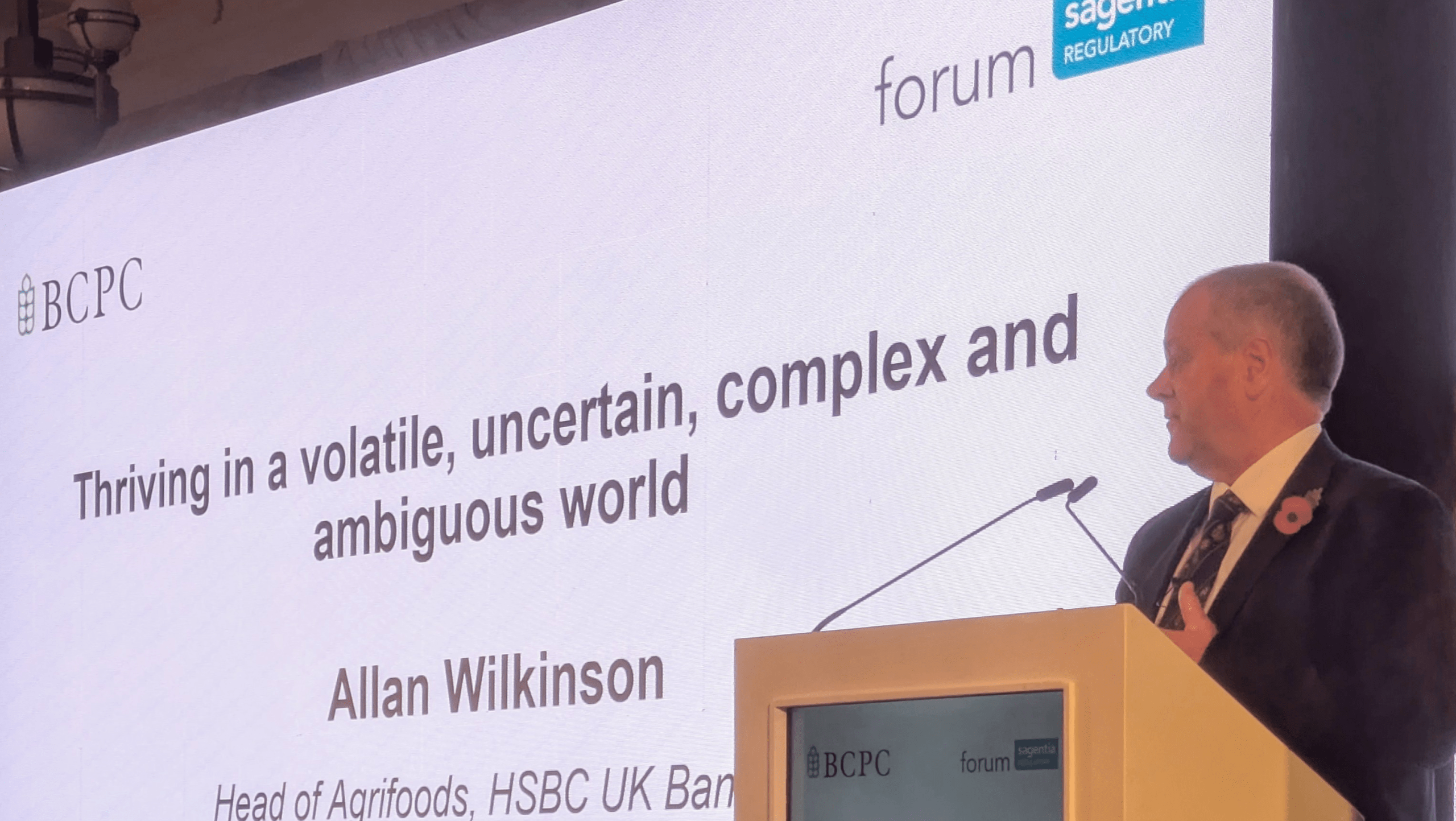
Navigating change – Congress covers the key issues
6th November 2025The 2025 BCPC Congress brought together leading voices from across agriculture, science, policy, and industry to explore how crop production must evolve in response to mounting global pressures. Over the two days, speakers addressed the challenges and opportunities facing the sector, with a strong emphasis on climate resilience, regulatory reform, technological innovation, and collaborative action.
(Pic: Allan Wilkinson, Head of Agrifoods, HSBC UK, presents the keynote speech – Thriving in a volatile, uncertain, complex and ambiguous world)
Whether through embracing new technologies, reforming regulation, or building climate resilience, the sector must adapt swiftly and collaboratively. The tone was one of cautious optimism—recognising the scale of the challenge, but also the ingenuity and commitment within the industry to meet it.
The full programme, and respective presentations are available below:
Chair: David Bell (Voluntary Initiative).
From Global Outlook to Local Action
- Allan Wilkinson (HSBC UK Bank plc) – Click to view presentation
- Dave Bench (CropLife UK) – Click to view presentation
- Sarah Woolford (AHDB)
- Robert Sheasby (Agricultural Industries Confederation) – Click to view presentation
Chair: Tony Pexton (Pexton and Son)
Trade, Regulations, and the future of food security
- Cecilia Pryce (Openfield) – Click to view presentation
- Rob Parker (G’s Growers Nurseries) – Click to view presentation
- Mike Rivington (James Hutton Institute) – Click to view presentation
- Dick Shaw (CABI) – Click to view presentation
- Prof Dan Bebber (University of Exeter) – Click to view presentation
Chair: Hazel Doonan (Agricultural Industries Confederation)
Issues influencing the future of crop protection and use of PPPs
- Richard Hull (Rothamsted)
- Max Newbert (Syngenta) – Click to view presentation
- Faye Ritchie (ADAS) – Click to view presentation
- Anthony Hopkins (British Society of Plant Breeders) – Click to view presentation
- Alexandra Rosenmund (GreenLight Bioscience) – Click to view presentation
- Lesley Last (Sagentia Regulatory, formerly TSG Consulting) – Click to view presentation
- Caroline Reid (Bioline Agrosciences) – Click to view presentation
Chair: Chris Hartfield (NFU)
PPPs Usage and Regulation
- Tracey Chantry (Fera) – Click to view presentation
- Helena Busby (Defra) – Click to view presentation
- Matthew Penrose (HSE CRD) – Click to view presentation
Key Themes that came across over the two days included:
- Climate Change and Resilience
Climate change is already reshaping pest, disease, and weed dynamics.
Speakers stressed the urgency of adaptation, with modelling tools like OurSmartFarm and scenario planning gaining traction.
Soil health, regenerative agriculture, and biodiversity were highlighted as foundational to resilience.
- Integrated Management and Innovation
Integrated Pest and Disease Management (IPM/IDM) is no longer optional—it’s central to sustainable production.
Advances in RNA-based crop protection, biopesticides, peptides, and precision agronomy are redefining the crop protection toolbox.
Smart technologies (e.g. AI, drones, smart sprayers) are emerging but need regulatory and data support.
- Regulatory Landscape and SPS Agreement
The UK-EU SPS agreement dominated discussions, with concerns over dynamic alignment, loss of regulatory autonomy, and potential impacts on PPP availability.
Defra and HSE committed to transparency and stakeholder engagement, but industry called for clearer timelines and performance metrics.
- Data, Metrics, and Decision Support
The UK Pesticide Load Indicator (PLI) is being developed to assess environmental pressure from pesticide use.
Decision support tools, benchmarking platforms, and visualisation systems are helping farmers make informed choices.
- Economic and Trade Pressures
Global trade volatility, food inflation, and changing consumer habits (e.g. weight loss drugs, sustainability demands) are reshaping market dynamics.
UK agriculture faces declining arable land, flat yields, and increasing reliance on imports—raising food security concerns. - Collaboration and Capacity Building
Expert groups (Weeds, Diseases, Pests & Beneficials) showcased cross-sector collaboration and called for industry-led innovation.
Support for early-career researchers and knowledge exchange was a recurring priority.
Organisations like CABI and AHDB emphasised the importance of global partnerships and farmer engagement.

